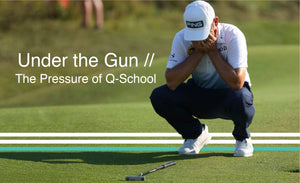Under the Gun // The Pressure of Q-School
Sep 30, 2022
By Evan Harmeling
When I was growing up, there was a true mystique surrounding Q-School. Anyone with a decent game would often boast, “if I get hot for a couple of weeks, I'll be playing with the big boys.” Then you have local guys at the clubs that host first stage say, “I know I can get through here, then it’s just one week and I have a shot at the tour.” You’d constantly hear stories of those who almost made it... “if he parred out his last 3 he would’ve been at finals...” “if he made birdie on the last hole, he’d have his Tour card”. You also hear tales of guys running the table to get through, but more often than not, you hear the horror stories. Books are written about it, with careers made, but more often broken, by this ruthless qualifying process.
It's a brutal series of survive and advance. Q-School whittles down the thousands that enter, to the 40 that are left standing with guaranteed starts. It's the ultimate meritocracy in golf. The four stages are pre-qualifying, first stage, second stage, and finals. Depending on which tour you’ve played, or if you have world ranking points etc, you can enter at different stages. The vast majority of players enter at the pre-qualifying or first stage.. with the task to finish inside the top 20 out of about 80 players at each site. Repeat that again and again until you reach the coveted Final Stage of Q-School.
Through 2012, the carrot at the end of the stick was 25 PGA Tour cards. However, for the last decade, those cards were eliminated, and Q-School was for the Korn Ferry Tour alone. As I write here, we are in the thick of First Stage of the Korn Ferry Tour Q-school. It’s important and exciting to note that next year, it will be PGA Tour Q-School once again, with 5 PGA Tour cards up for grabs in 2023.
I’d like to share a few of my Q-School stories and talk about the unique pressure that Q-School produces.
Second stage is perhaps the most nerve racking 4 rounds of golf a player can experience. It certainly was for me. I haven’t played on Tour, but my experiences in final groups of Latin American events, Korn Ferry events and state opens, pale in comparison to how I felt at second stage. First stage is one thing, but you aren’t really THAT close. Second stage is the difference between having status on the Korn Ferry and a shot at the PGA Tour, or having nothing. It's the difference between getting a staff bag and buying your own. It’s the difference between Scotty making you a circle T, and bootlegging one from a friend on Tour. It's legitimacy vs being a rogue mini tour player. Most importantly, it’s the difference of being on the doorstep of the PGA Tour vs. it being a pipe dream.
It was one thing 15-20 years ago, when the mini tours were thriving, and you could make decent money playing the Hooters Tour and support yourself financially if you were a good player. More recently, the difference between having status and not, is enormous. In terms of gaining sponsors, earning prize money, having a place to play (TPC courses), and for one’s psyche, its difficult to over-emphasize this fact. I’ve seen a lot of great players, players that for sure had the ability to play on the highest level, quit, because they didn’t have real status for a couple of years. That will wear on you, and the clock starts ticking very quickly if you aren’t showing great results elsewhere. Furthermore, if you aren’t fortunate enough to have financial backing, it's easy for potential sponsors to lose faith in a player residing in status no-mans-land.
Hence the importance of second stage.
My first experience at second stage came in my second year as a pro. I signed up for Southern Hills Plantation, in Brooksville, FL and was rearing to go as I started on 10 the first day. Sure, I’d played a practice round, and I may have even hit a ball from the back tee box. However, stepping up onto that tee on day 1 was a different story. There was so much excitement and pressure that came with being at second stage. I got my pin sheet and scorecard and looked up… the shot I remembered from the practice round looked a whole lot different. In subsequent years, I think that tee box might even be overgrown, but back in 2013, it was very much alive, and the tees were there day 1. So I had a 240 yard forced carry over the shit, with a hazard left and OB right, and the fairway pinching in hard at 300 yards. Looking back, 3 wood could’ve been the play, but that face looked pretty small with my adrenaline pumping, and did I really want to leave myself a blind 200+ yard shot into the first green? It was also first thing in the morning, temps in the 50s with a breeze in our face, was I even going to carry 240? So I pulled out driver, and proceeded to park two balls OB, starting off my second stage with a crowd pleasing 9. Being 5 over through 1 was a tough feeling. Paying thousands of dollars to enter Q-School, working hard all year on the Canadian Tour, getting so high on life after getting through first stage, and then starting with a 9. My head felt like a furnace, feeling pressure from all sides with the weight of the task at hand. You just can't scrape it around and get through second stage, so now I had to make up an extra 6 shots (forgot to mention that I bogeyed the second hole)! I battled hard that week, and I remember thinking with 12 holes left the final round, that if I birdied all 12 holes, I would get through. It didn’t happen, but that experience made it that much sweeter when I did get through 3 years later in 2016.
After two more failed tries in between at Southern Hills, I kept coming back and got through on the number. I remember making the turn during the final round and taking the cart ride to that same 10th hole. I had gotten an idea of what the cut was going to be, and kept telling myself, “find a way to shoot 2 under.. just 2 birdies.. this is not that hard, you can do this.” I really buckled down that final 9 holes, and hit the ball great. Making putts with that pressure was a different story. I did manage a 2-putt birdie on the par 5 12th, and made a prayer of a 30-footer on 14. I had to lay up on the par-5 16th and missed the green with a wedge. After a nerve racking up and down there, and a “let's just hit the green and get out of here with 3,” par on 17... I missed the green short on 18. I absolutely flagged a 9-iron, but incorrectly assumed the adrenaline of the moment would give me an extra 5 yards. It landed short and spun back off the front. After chipping it up, I knew I needed this 8-footer for par to have a chance. My heart was beating out of my chest, and I couldn’t even remotely feel my hands. It was thanks to a lot of putting practice, and faith in that work, that I made a good stroke and knocked it in. At that point, you have to say “screw it.” I had been working on my breathing, but the magnitude of that putt for me was too big, nothing was going to calm my heart rate. Hopefully you have a routine dialed in, and I did, because that’s what you can fall back on when the pressure of the moment is on top of you.
The joy and relief I felt after getting through that day was unlike anything I’ve experienced in golf. I’d been playing professionally for 4+ years, and getting to Q-School finals legitimized all the work I’d done, and it gave me fuel to keep playing.
That experience exemplifies the fine lines at Q-School. What if that putt didn’t drop? What if someone else had made birdie on 18 and knocked me out of finals? These things happen at every first stage site, and every second stage site. They happen around the number at final stage. The difference between having a chance at the PGA Tour, being in golf limbo, or eventually quitting, is often completely out of your control. And even in the case of my putt, was I really in control? Moments like that made me question that idea.
Golf is such a crazy game, with razor thin margins. If you’re clubface is a couple degrees open at impact, you’re OB. If you jerk your hands slightly through the putt, you’re staring at a 6-foot comebacker. Q-school amplifies those margins. It separates guys that truly believe in themselves, and believe in the work they’ve put in. Without those two ingredients, you’re fighting an uphill battle in pressure situations. Q-school is merciless, and many guys are left out in the cold seemingly because of one swing here, or a putt there. But if you can get prepared, rise to the occasion, take advantage of your birdie chances and get off the bubble, you can cruise.
It’s always fascinating to see how the final few groups at each stage play the last round. Maybe one guy struggles, but a lot of the time you’ll see all the leaders shoot 6, 7, 8 under par, simply because they are free of the pressure of being on the bubble. When a good player has prepped hard for months, played tournaments, and dialed everything in, guys are elite nowadays at this game. So what stops everyone from making birdies on end every single round? Green firmness? Wind? Pressure. Nowhere is it more evident than Q-School. Nowhere else do you see guys fall apart after getting on the wrong side of the 8-ball, or cruise once their fate is relatively secure.
I feel fortunate that I’m not grinding it out at first stage this week. Writing about that pressure makes me re-live those moments, and shudder. They’re not fun. It’s interesting because I love the pressure of tournament golf, but Q-School pressure is different. Your whole year boiled down to 4 rounds, where every swing you feel your career as a golfer hangs in the balance. There's no prize money until finals. A pat on the back, good job, but you better bring it next stage. It doesn’t feel just. But that’s golf, and perhaps Q-School is the best representation of what the game is. Perfection is unattainable, only the lucky few succeed, and the division is unforgiving.
Is Q-School for the player, not the game? I don’t know. I’m just happy to be writing this week and not playing.

